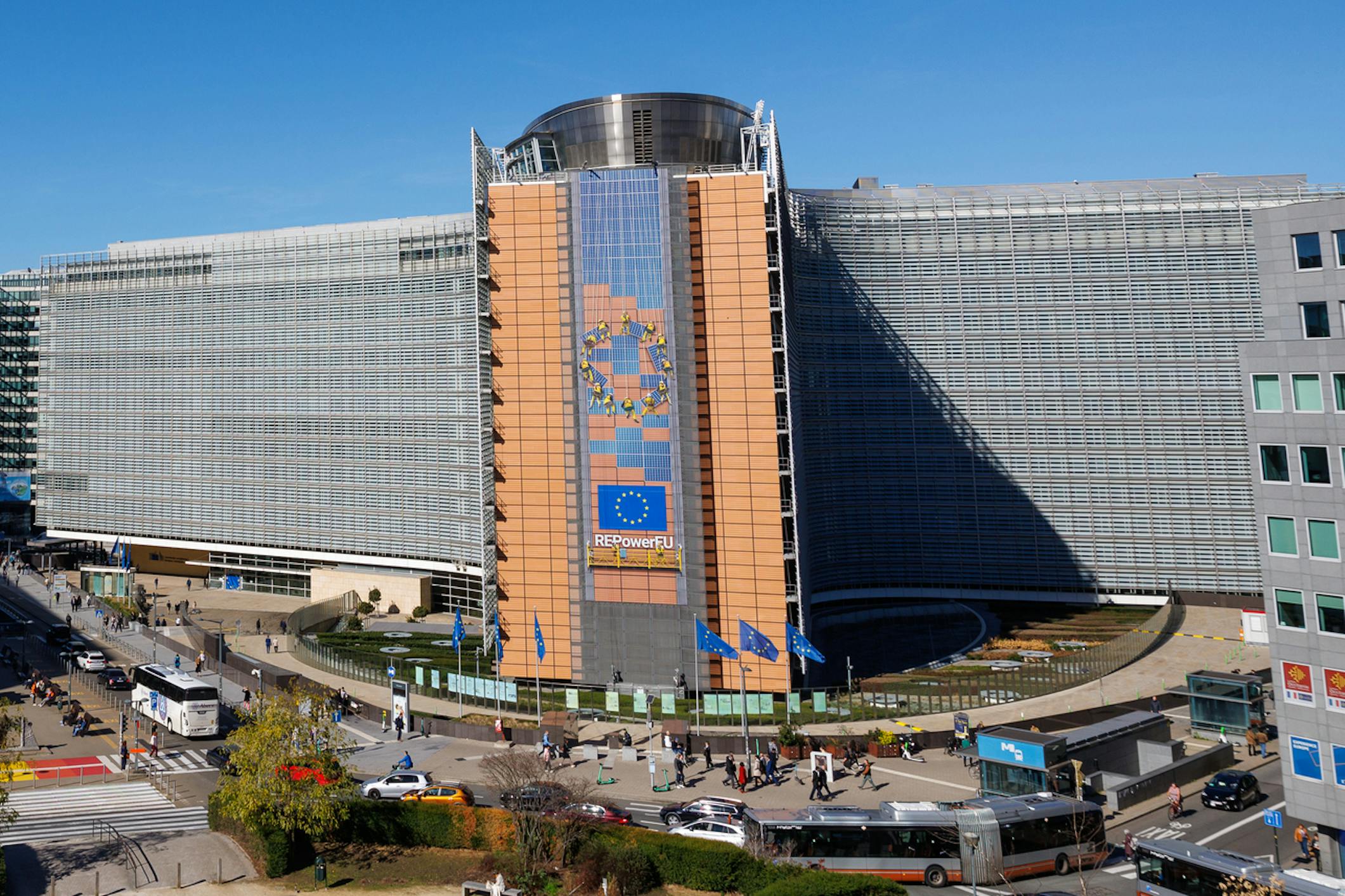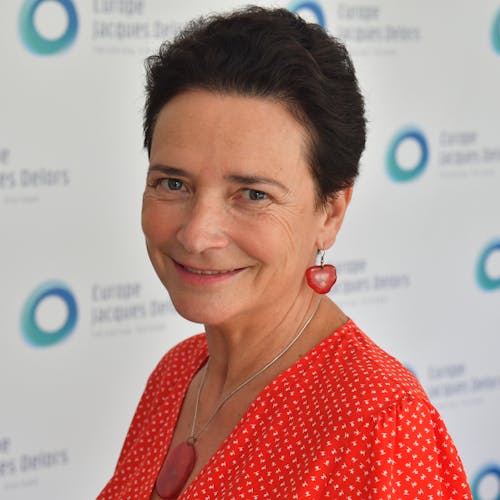
Content
- Von der Leyen completes the Commission puzzle – with an emphasis on sustainable competitiveness - Geneviève Pons, Director-General and Vice-President
- The EU will need to focus on coordination to deliver on the green transition - Sophie Pornschlegel, Director of Studies
- Šefčovič’s new challenge: Balancing Trade, Economic Security, and Sustainability - Cláudia Azevedo, Policy Analyst, Greening Trade - Simon Ruehle, Programme Assistant, Greening Trade
- Christophe Hansen: A safe choice to depolarise the agri-food debate - Sophia Caiati, Policy Analyst, Agrifood - Andrea Pratelli, Programme Assistant, Agrifood
- Cypriot Costas Kadis to work towards a competitive and sustainable EU blue economy -Lola Gernigon, Policy Analyst, Ocean
Von der Leyen completes the Commission puzzle – with an emphasis on sustainable competitiveness
Commission President von der Leyen presented her new College of Commissioners on 17 September, with one Commissioner not yet formally nominated (Marta Kos from Slovenia), and a last-minute change for the French nominee, as Thierry Breton was replaced by Stéphane Séjourné. Composing the new College is always a challenging exercise, with the need to strike a balance between member states, political parties, and keeping a certain gender equality.
It is particularly the case in a troubled political environment which has led notably to a discrepancy between the composition of respectively the European Parliament and the Commission as its members are chosen by the heads of state and government and reflects their political affiliation which in this legislature does not match the one of the Parliament, directly elected by European citizens. The most striking imbalance concerns the S&D which still represents 19% of the seats in the EP but has got only 5 candidates in the Commission, as much as the liberals that represent less than 11% of the seats in the EP. Another striking imbalance is the gender one. In the preceding Commission, there were 50% of female Commissioners. In this one, they will reach 40% thanks to Mrs von der Leyen insistence to get female candidates. She succeeded in growing their number from initially 7 to 10. It is however still not sufficient to get the gender balance that she was seeking.
To correct these two imbalances, she has nominated a majority of women at the very top, 4 of her 6 Executive Vice President being women and two of them being from S&D. We are coming from far in these two domains and this should facilitate the auditions in the EP. There remain however some problems in the proposed attribution of portfolios, starting with the entry in this top category of Executive Vice-President (EVP) of one member of the European Conservatives and Reformists (ECR), namely Mr Raffelle Fitto. One must also notice that, more than 20 years after the Nice treaty, which aligned the number of Commissioners among larger and smaller member states, we now have a Commission set up where 5 of the 6 most important portfolios are in the hands of nationals of the “5 big” (Germany, Spain, France, Italy, Poland).
In terms of portfolios, this new College confirms the priorities already set out in von der Leyen’s political guidelines in July, with a strong focus on sustainable competitiveness and security. As far as the objective of sustainable competitiveness is concerned, I wish to underline one striking challenge and two big assets. The striking challenge is in the fact that portfolios notably at the level of EVPs are very much overlapping. Look at the ones of Teresa Ribera and Stephane Séjourné. They will, both of them, have to play a leading role in making the green industrial transition a success. They will, both of them, have to rely strongly on Commissioner Hoekstra, responsible for climate, net zero and clean growth. It can work if they work closely together, share the same objectives and analysis. If not, Mrs von der Leyen will have to decide. This means that she will need not only a strong cabinet but also a strong Secretariat General, stronger than in the preceding Commission.
The two big assets are to be found in the way she is reshaping the two strongest Commission portfolios, namely the trade and competition ones, putting them in solid hands and giving them a new purpose. Mrs Ribera is not only in charge of Clean, Just and Competitive Transition, she is also in charge of competition policy. To get industrial champions in the green transition, such a move can be precious. In a similar manner, she puts in the hands of Maros Sefcovic, no longer an EVP but a particularly experienced Commissioner, not only trade but also economic security and customs. It gives to trade a clear new purpose, economic security, but also the authority over instruments such as customs that are key to achieve certain tasks as for instance the CBAM implementation.
The economic dimension of the green transition – necessary to ensure that the transition makes Europe’s economy more competitive rather than lead to deindustrialisation – is also found in Jessica Roswall’s new portfolio as Commissioner for the Environment, Water Resilience and a Competitive Circular Economy. Last but not least, the Commission adopted an integrated approach for fisheries and ocean, a demand that we made at Europe Jacques Delors in the context of our Manifesto for a “European Ocean Pact”. A pure “fisheries” approach that would have brought us 15 years back had to be avoided. The integrated approach, finally chosen and put in the hands of the Cypriot Commissioner Costas Kadis, will help bring together the social, economic and environmental dimensions in ocean governance.
Geneviève Pons, Director-General and Vice-President
The EU will need to focus on coordination to deliver on the green transition
Besides the new Vice-President Teresa Ribera, two Commissioners are in charge of sustainability policies in this new Commission: Wopke Hoekstra is nominated as Commissioner for Climate, Net Zero and Clean Growth. The Dutch politician, who previously worked as a finance minister, already came to work for the European Commission in August 2023, when Frans Timmermans, who was Vice-President in charge of the Green Deal, left European politics to run in the Dutch national elections. Jessica Roswall, the former Swedish Minister for European Affairs, is nominated as Commissioner for the Environment, Water Resilience and a Competitive Circular Economy. In their mission letters, the two Commissioners are called to closely work together, emphasising von der Leyen’s wish to bring together the environment and competitiveness. Both will also work closely with Teresa Ribera, who will have the difficult task to ensure that climate and the environment continue to be tackled together, rather than in silos.
All three Commissioners come from different party backgrounds: While Ribera is a Spanish socialist who has a proven track record in the field of climate policy, Wopke Hoekstra is a conservative who has not been known for his ambition to tackle climate change. He belongs to the European People’s Party (EPP), who has famously tried to water down and block the Nature Restoration Law in the last year before the EP elections. Jessica Roswall is from the Swedish Moderate Party, which belongs to Renew Europe. The nationalities of the nominees should, however, not affect the portfolio too much. However, the Netherlands and Sweden both have far-right parties in their governing coalitions, which could make their position a little trickier to navigate than Teresa Ribera, who can count on the support of the Sanchez government. These different party families could also be useful to find agreement in both the European Parliament and the Council, as any files on climate and the environment are likely to trigger difficult negotiations in the upcoming five years – the topic is unlikely to become less controversial in an increasingly polarised political context.
Sophie Pornschlegel, Director of Studies
Šefčovič’s new challenge: Balancing Trade, Economic Security, and Sustainability
With Commissioner Šefčovič now set to oversee a strategic portfolio that spans both trade and economic security, Commission President von der Leyen is signalling the importance of trade by entrusting it to someone with a longstanding EU experience. While these two agendas are increasingly interconnected, there is a risk of the portfolio becoming overly complex, and of trade being viewed solely through the lens of economic security, and in particular the “protect” rather than the “partnership” aspect. Šefčovič’s experience as Vice-President in charge of the European Green Deal from 2023 to 2024 will hopefully further integrate sustainability into the EU’s trade.
Going forward, the EU should more effectively address the unintended impacts of EU green policies on partner countries by working with other Commissioners to better align the EU’s trade, environmental, and development agendas. This integrated approach should be implemented all along the policy cycle and across different instruments, from the design and implementation of autonomous measures to the finalisation of trade agreements under negotiation. The rollout of new “Clean Trade and Investment Partnerships”, which were announced in von der Leyen’s political guidelines in July presents an opportunity to strengthen cooperation with like-minded partners, provided they are designed and implemented in a way that ensures mutual benefits and advances sustainability both in the EU and in third countries.
Cláudia Azevedo, Policy Analyst, Greening Trade
Simon Ruehle, Programme Assistant, Greening Trade
Christophe Hansen: A safe choice to depolarise the agri-food debate
Picking Luxemburgish Christophe Hansen, an EPP member with a personal farming background, for the agriculture portfolio seems to be a reasonable choice. Since 2023, Hansen has been part of Luxembourg’s national agriculture committee and previously led negotiations on the EU Deforestation Regulation (EUDR). With additional expertise in EU affairs, environmental, and trade issues, he could be well-positioned to help depolarise the ongoing debate around the EU's farming policy. As a Member of the European Parliament from 2018 to 2024, Hansen also played a relevant role in steering the regulation on CAP national strategic plans for the ENVI Committee. In the past, he stressed the importance of shaping agricultural policies to address the specific needs of different member states, advocating for greater national flexibility and less centralisation, aligning with the approach of the 2023-2027 CAP.
The new designate Commissioner will be responsible for implementing the recommendations of the Strategic Dialogue, preparing a Vision for Agriculture and Food within his first 100 days. Hansen's work will include developing an EU-wide sustainability benchmarking system and aligning agri-food policy with key EU priorities such as food sovereignty, enlargement, and competitiveness. He will also address critical challenges like generational renewal and climate risk preparedness. Let’s also hope that von der Leyen’s pick will be able to manage the difficult negotiations that await the EU in the context of the next Multi-Annual Financial Framework, where direct payments are likely to be cut to free funds for other policy fields, such as a defense.
Sophia Caiati, Policy Analyst, Agrifood
Andrea Pratelli, Programme Assistant, Agrifood
Cypriot Costas Kadis to work towards a competitive and sustainable EU blue economy
After speculation about a potential split between the fisheries portfolio from the environment one, President Ursula von der Leyen announced in July a future Commissioner for Fisheries and Oceans. The challenge for Costas Kadis, who was entrusted with this position, will be to promote this integrated approach aimed at supporting a sector facing numerous challenges, such as the renegotiation of the UK-EU Trade and Cooperation Agreement (TCA), while ensuring the protection and regeneration of our marine and coastal ecosystems. In this regard, Costas Kadis will bear responsibility, among other things, for exploring the feasibility of European blue carbon reserves, which could be an important tool to tackle the climate and biodiversity crises.
An islander, professor of biodiversity conservation and Cypriot minister who represented his country at Agri-fish Council meetings, Costas Kadis will be in charge of delivering on Ursula von der Leyen’s commitment to a “European Oceans Pact” - a proposition from Europe Jacques Delors and partners which was taken over in Mrs. Von der Leyen’s political guidelines. The new Commissioner will have to implement a strategic vision of ocean issues, making sure to closely work with his fellow Commissioners for transport, the environment, climate, energy and the Mediterranean. If the coordination is well done, this represents a real opportunity to make the EU a global leader in ocean governance.
Lola Gernigon, Policy Analyst, Ocean








